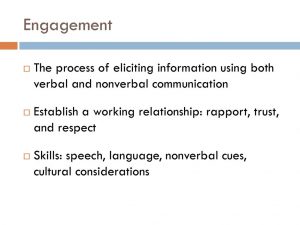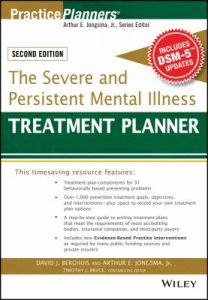
Engagement is an ongoing component of the dynamic and interactive social work practice process with and on behalf of diverse individuals, families, groups, organizations, and communities. I value the importance of human relationships with my clients. I will strive better to understand human behavior theories and the social environment and critically evaluate and apply the knowledge to facilitate engagement with clients and constituencies, including individuals, families, groups, organizations, and communities. I will engage with diverse clients and constituencies to advance practice effectiveness and develop strategies in practice throughout my career. I understand that my personal experiences and affective reactions may impact my ability to engage with diverse clients and constituencies effectively. I value relationship-building principles with co-workers and clients and inter-professional collaboration with co-workers to facilitate engagement with clients, constituencies, and other professionals as appropriate. I will apply knowledge of human behavior and the social environment, person-in-environment, and other multidisciplinary theoretical frameworks to engage with clients and constituencies. I will use empathy, reflection, and interpersonal skills to engage diverse clients and constituencies effectively.
Evidence
6A – Examine evidence-based practices to prepare for professional engagement across the system
Field Evidence: During field practice, I had the opportunity to interact with 19 different clients in individual therapy settings. Before our therapy sessions, I examined evidence-based practices to prepare for our sessions. Some modalities I examined included CBT, mindfulness, person-centered approaches, DBT, grounding techniques, motivational interviewing, and solution-focused brief therapy. I examined the DSM-5, the severe and persistent mental illness treatment planner, and other resources before engagement with clients. Please review a sample of my journal entries that indicate this Examining Evidence-Based Practices.


Other Evidence: I attended a training offered by NASW: Engaging and Working with the Hard-to-Reach Client. This training educates regarding the four phases of working with clients. This provided an overview of how to tune in and respond directly to indirect communications. The training also discussed false dichotomies and phony dualisms, which is when we believe we have to choose between what we perceive as two opposite interventions. This training was particularly beneficial when interacting with the clients I saw in the field.
6B – Engage with systems utilizing evidence-based practice strategies
Course Evidence: I demonstrated engagement skills in course work that I transferred from Barry University to Advanced Clinical Work with Individuals. Demonstration of engagement skills can be found in this audio file. I was able to utilize Cognitive Behavioral Therapy, Mindfulness through the use of Grounding Techniques, and referral to outside resources to help the pseudo client interact with more people that are in similar situations.
Course Evidence: In Advanced Clinical Practice 2, I engaged in group therapy with pseudo clients. I utilized evidence-based practice strategies by using grounding techniques, Yalom’s therapeutic factors, and mindfulness concerning a pseudo group dealing with anxiety. I demonstrated engagement skills through recording a video of myself conducting group therapy. I was also able to identify specific skills taught within this course in my Self-Assessment Paper.
Field Evidence: During field practice at the McNabb Center, I engaged with clients in individual settings, intensive outpatient groups, and a peer support setting using evidence-based strategies within each of these systems. Engagement within each of these settings was discussed in weekly supervision sessions and documented through journal entries. Please view Engagement with systems.